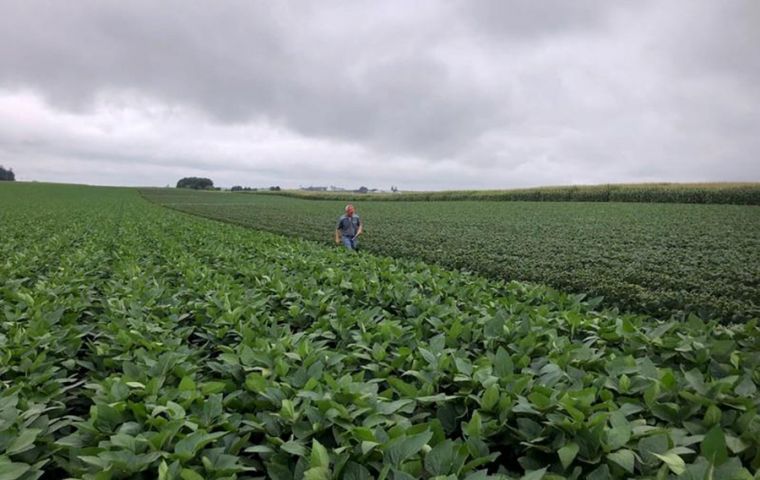MercoPress. South Atlantic News Agency
Brazilian soy farmers concerned with new Bayer biotech herbicide, Dicamba
 “In the U.S., where the technology has already been launched, weeds are different from those in Brazil. There dicamba is an essential tool,” Aprosoja said.
“In the U.S., where the technology has already been launched, weeds are different from those in Brazil. There dicamba is an essential tool,” Aprosoja said. Brazilian farmers are wary of the imminent introduction of a new genetically modified soy seed technology because of the risks associated with dicamba, a herbicide the biotech product is designed to tolerate.
Widely used in the United States, dicamba has been described as a volatile product that drifts off easily and may compromise non-tolerant soybeans.
“When dicamba lands on plants that haven’t been designed to resist it, those plants struggle,” said Cayron Giacomelli, a farmer and agronomist. “Dicamba is highly harmful to materials other than Xtend,” Giacomelli said.
National grain growers association Aprosoja said last Friday that Bayer AG, owner of the “INTACTA 2 XTEND” seed technology, is inviting local farmers to participate in trials this season.
Aprosoja urged them to seek information from Bayer regarding the impact on crops of the use of dicamba, adding there are alternative week killers in Brazil.
“In the U.S., where the technology has already been launched, weeds are different from those in Brazil. There dicamba is an essential tool,” Aprosoja said.
Bayer said the new seed combines biotechnology with new crop protection tools to boost farmer yields “to a new level.”
Brazilian grain growers may buy into it, but want Bayer to be accountable for any issues.Antonio Galvan, president of the Mato Grosso grain growers association said that problems arising from the application of dicamba in the U.S. are a concern.
“If this product comes to market the company should be fully responsible for any problems that may occur,” Galvan said. He said non-tolerant soy is one of the most susceptible plants to dicamba’s toxicity.
Bayer said it is prepared to answer questions and train farmers extensively should they decide to adopt Xtend. “The choice of what technology to use always falls on the farmer,” it said.
Aprosoja said in the U.S. more than 2,700 complaints have been filed by non-users of the Xtend technology who were affected by dicamba drifted from neighboring farmers.
Brazil’s wider planting window poses risks that U.S. farmers do not face, Aprosoja said. “Dicamba is dangerous. We have no need of it”




Top Comments
Disclaimer & comment rulesCommenting for this story is now closed.
If you have a Facebook account, become a fan and comment on our Facebook Page!